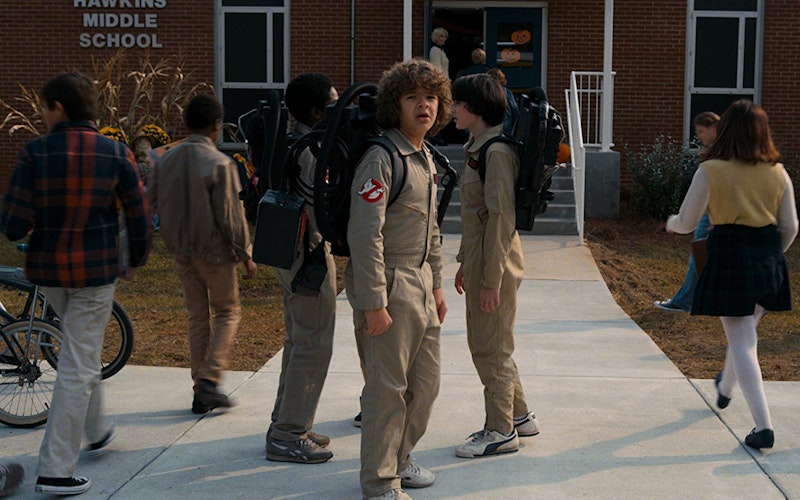
TV
The Horrible Familiarity of Stranger Things
For the last year, a part of me has been stuck in the Stranger Things story.
Stranger Things opened a new world for me, and I’m not just talking about the “Upside Down”—the dark and evil abyss that swallowed young Will Byers (Noah Schnapp) in season one. Certain pieces of art feel like a privilege for a generation to take part in, and Stranger Things has been like that for many of us. My heart was moved by the fierce bravery of a mother longing for her missing child; by the bond among childhood friends; and by the skepticism and yet unspoken hope of a small town's police chief as he investigates Will’s mysterious disappearance. Stranger Things captured the human experience as we live between the brokenness of this fallen world and an eternal hope that has been written on our hearts.
When season one ended, I felt as if the whole world sat still. I’ve been anticipating Stranger Things season two ever since, especially since the finale left us with so many questions: how dead is Barb (Shannon Purser); why the heck is Will throwing up little slugs; and why is the sheriff hiding those Eggos!?
Season two was released last week and many of you have probably binged the whole thing by this point. In the off chance that you haven’t, I’d encourage you to take it slow. After all, you will only experience Stranger Things season two for the first time once. We might as well savor the sweetness of reuniting with our favorite characters.
Once again a bold, science-fiction color palette, reminiscent of the 1980s, is mixed with the dark and sinister feel of a Stephen King film from that same era. The show is both eerie and heartfelt, a weird and complex combination that ultimately evokes vulnerability. The musical score recalls both vintage sci-fi instrumentals and ’80s pop classics. The nostalgia is thick.
TC Podcast: Stranger Things - Grace in the Upside Down
Watching the first episode of this new season, I am thrown off at first by a car chase, fearful that season two will be a completely different storyline altogether. But then I see a familiar tattoo, revealed on the wrist of a stranger who appears to have telekinetic powers—just like Eleven (Millie Bobby Brown), the terrified, timid girl who escaped from a secret facility in season one and joined up with Will’s friends. A close-up reveals the numbers 008 and my intrigue is ignited: Is Eleven not the only one of her kind? Will we see a band of telekinetic women with shaved heads battle the monsters of the Upside Down?
The appearance of 008 is not the only new factor at play in season two. I also see a new side to many of the returning characters. They seem to be carrying a burden, struggling to cope with the disturbances of their past. They are worn down by a fallen world and its harsh realities. And so coping mechanisms become a recurring theme. Joyce Byers (Winona Ryder), frayed by the search for her son, seeks normality in a new relationship. Hopper (David Harbour), the broken and gritty yet genuine police chief, is in full protection mode, quarantining Eleven in his home and reminding her, “We don’t take risks because risks are stupid and we are not stupid.” Will, who is now safe and sound, nevertheless struggles to rejoin a community that considers him a freak. Nancy (Natalia Dyer), the traumatized older sister of one of Will’s friends, gets wildly drunk, “pretending to be a stupid teenager,” while trying to deal with the death of her best friend Barb. The horror of these characters’ circumstances and the hurt they’ve suffered are beginning to take a toll. They are all just trying to get back to “normal.”
As I empathize with these characters, who are so wounded and weak, I am also captivated by the possibility for a much-needed hope. There is a desire in Stranger Things to be saved, somehow, by something bigger than ourselves. Something otherworldly, as we know that the earth is far too full of despair to save itself. Stranger Things season two can be seen as telling evidence of our need for God. That need is laced into the fabric of each character, as they realize there is no earthly cure, no coping mechanism that heals.
Christians know too well that the world is full of folly and pain. God never wanted us to experience things like the loss of a child or the death of a friend, but sin has made that part of the “normal” human experience. We became like God, knowing both good and evil, with the Fall. From that point forward, every man and woman who has walked the earth experiences the brokenness of sin.
Like the characters in Stranger Things we employ coping mechanisms, yet as Christians we also have hope. And it’s a hope, crazily, born of the fiery furnace of suffering. At the cross, God turned the horror of this world upside down, using it for our good and his glory. Likewise, our hope and faithfulness are interwoven with our struggles in this life, as we “glory in our sufferings.” “Dear friends,” Peter wrote, “do not be surprised at the fiery ordeal that has come on you to test you, as though something strange were happening to you.
The human condition in this fallen world is strange indeed. Stranger Things season two recognizes this hard truth in creative, captivating ways. In doing so, it reveals the need for a hope of its own—one found not in earthly places, but in unknown, stranger, and inhuman ones.
Topics: TV, Culture At Large, Arts & Leisure